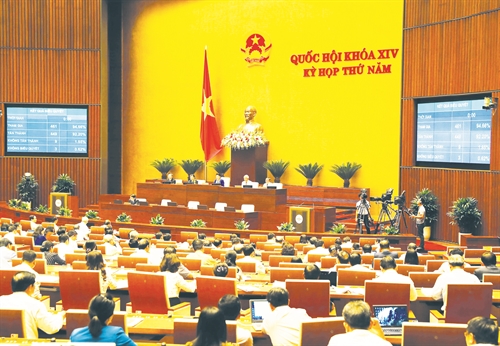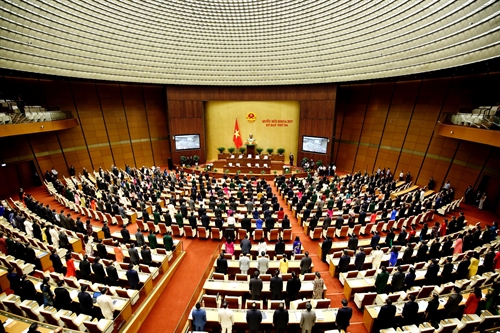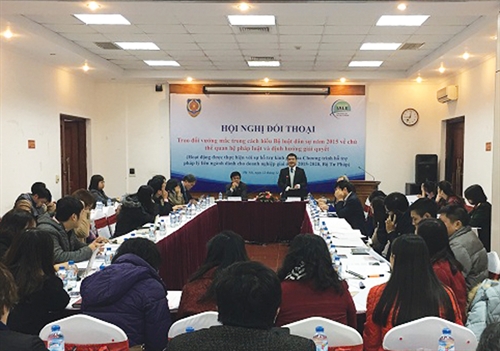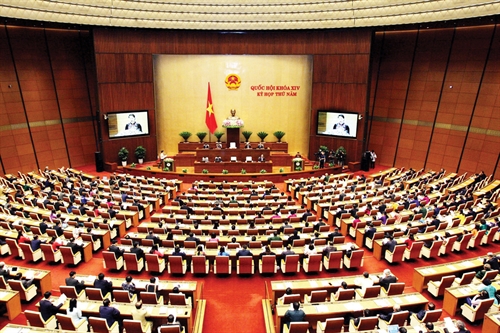Tuong Duy Luong
Lawyer, arbitrator of Vietnam International Arbitration Center
The 2015 Civil Code (the Code) defines common ownership as ownership by different subjects, natural or legal persons, over their common property. Common ownership has different forms and, with each form, the involved subjects exercise their rights to possession, use and disposition of their common property in different ways. Taking into account this reality, the Code only regulates the most general principles in the management, use, disposition and division of property under common ownership and termination of common ownership.
The right to manage common property
The owner of a property exercises the rights to possess and manage the property not only to preserve and maintain it but also to exploit benefits from it, and ensure the property is always under his control. As a common property is owned by different subjects, its possession and management are not dictated by the will of any individual co-owner but must satisfy the demands of all co-owners. Therefore, the management of a common property must be based on the agreement reached among its co-owners. This agreement reflects the rights of the subjects as well as guarantees the effective management and exploitation of their common property. Article 216 of the Code states: “Co-owners shall jointly manage their common property on the principle of unanimity.”
This principle requires the co-owners to reach consensus in managing their property with a view to maintaining, preserving and developing the property. The unanimity may be reached by all or a majority of them and is binding on all co-owners.
Depending on the form of common ownership, the principle of unanimity may be expressed in the charter, regulation, cooperation contract or internal rules. Even when the agreement or unanimity of the co-owners is not made in any of the above forms, it still has legal validity.
Should a law provide the management of a certain common property, the co-owners must abide by such provision. For instance, regarding common ownership within a condominium, the Code specifically stipulates: “The area and equipment under common use within a condominium come under common ownership of the owners of all apartments in such condominium and are indivisible…” In order for the management and use of the common-use area to satisfy their interests, co-owners should reach agreement on internal regulations of the condominium to specify the management and use of the common-use area, or they may even agree to divide part of the common-use area if such is not banned by law.
 |
Park City center in Ha Dong district, Hanoi with a 11-hectare central park for common use by residents__Photo: Internet |
Use of common property
In principle, the co-owners have rights as well as obligations over their common property. But as analyzed above, depending on the form of common ownership, these rights and obligations are different, and the rights to use and benefit from common property also vary.
In common ownership by share, as each owner’s share in the ownership rights has been determined on the basis of agreement or provisions of law, each owner only has the right to exploit the utilities of and enjoy benefits from the common property in proportion to his share in the ownership rights. However, the method of exploiting the common property depends on the nature and utilities of the property, and benefits from the exploitation will be distributed based on the proportion of each owner’s share in the ownership rights.
If the co-owners otherwise agree, the use, exploitation of utilities and enjoyment of benefits from their common property do not rely on each owner’s share in the ownership rights but must comply with their agreement. This agreement may allow one owner to use or benefit from the common property not in proportion to his share in the ownership rights.
In case the law allows a co-owner of a common property to exploit and benefit from the property regardless of his share in the ownership rights, he may also exploit and benefit from the property according to such law.
Meanwhile, under divisible or indivisible common ownership by integration, each owner’s share in the ownership rights cannot be determined as long as this type of ownership exists. So, the co-owners have equal rights in exploiting the utilities of and enjoying benefits from their common property. However, the Code still respects the self-decision of these co-owners, stipulating that if they reach an agreement that some of them do not have equal rights over their common property, such agreement must be honored by all co-owners. In case there arises a dispute over such agreement and it is brought to a competent body for settlement, this body must consider the agreement and, if seeing such agreement is not contrary to law, it will order the co-owners to implement it.
The right to dispose of common property
The rights to possess, manage, use and dispose of a property, regardless of whether it is under private or common ownership, are important, basic rights of its owners. For private ownership, the property owner has absolute autonomy in possessing, managing, using and disposing of his property. For common ownership, the rights and interests of the co-owners are closely interrelated, so each co-owner’s decision has direct impacts on the interests of the others. In fact, the relationship between the co-owners is not always harmonious but sometimes come into conflict. So, lawmakers always pay special attention to clearly defining the scope and limit of each owner’s right to disposition to balance the parties’ interests and reduce conflicts of interest.
The owner’s disposition of a property is the decision on the legal or actual fate of the property. In common ownership by share, each co-owner has the right to disposition corresponding to his share in the ownership rights. Any action beyond this share will be considered a violation of the law and any damage caused to other co-owners must be compensated. On the contrary, other co-owners may not interfere in or limit a co-owner’s right to disposition. However, in some cases, the co-owner disposing of the property is subject to certain control to ensure such disposition does not harm the interests of his own as well as the other co-owners. Typically when a co-owner wants to sell his share in the ownership rights, he must respect the other co-owners’ preemptive right to buy such share. As stated in Article 218.3 of the Code, after three months, for a common immovable property, or one month, for a common movable property, from the date the other co-owners are notified of the sale of a share and sale conditions, if none of them expresses their wish to buy the share, the owner of such share can sell it to another person. The Code stresses that such notification must be made in writing and the sale conditions must be the same for co-owners and other persons.
If the seller does not respect the other co-owners’ preemptive right to buy shares and sells his share to a third party before the expiration of the law-prescribed time limit for exercising this right, within three months after detecting the infringement of this preemptive right, other co-owners that wish to buy the share may request the court to transfer the buyer’s rights and obligations to them.
On the other hand, other co-owners, albeit being permitted by law to have the preemptive right to buy a share of one co-owner, are not allowed to abuse this right to cause difficulties to the share sale and seek to buy the share at a cheap price lower than the market price.
In reality, there have been cases where only after a co-owner signed a share sale contract with a third party, did the other co-owners know that their preemptive right was infringed upon. Within three months after being aware of this infringement, these co-owners should file a lawsuit against the infringing co-owner with a competent body, requesting cancellation of the share sale contract. Once this body accepts the request to cancel the contract, the buyer’s rights and obligations will be transferred to the suing co-owner. In order to quickly settle the case, the competent body must involve the third party in the proceedings, settle consequences of the cancelled contract, and settle the claim for compensation (if any).
If this body is a commercial arbitration, it may order the third party to participate in the proceedings only when this party consents to the arbitration agreement.
If this body is a court, it needs to make clear that it will not settle consequences of the cancelled contract in case the third party does not request the court to do so.
In case a co-owner of a property under common ownership renounces his share in the ownership rights or dies without an heir, the Code makes different provisions applicable to immovable and moveable property.
In case of immoveable property, Article 218.4 of the Code states this share will belong to the State, except the case of common ownership of a community where this share will come under common ownership of the other co-owners. In case of movable property, such share will come under common ownership by other co-owners.
In case all co-owners renounce their shares in the ownership rights over a movable or immovable common property, the establishment of ownership rights over such property is regulated by Article 228 of the Code regarding derelict property.
This Article 228 stipulates:
“1. Derelict property is a property whose owner has renounced his ownership rights over it.
The person who finds or is managing a derelict movable property has the right to own such property, unless otherwise prescribed by a law; if it is an immovable property, it will belong to the State.
2. The person who finds a property whose owner is unidentifiable has to publicly announce such finding or hand over the property to the commune-level People’s Committee or public security agency of the nearest place for making public announcement for the property owner to reclaim it.
The handover of the property must be stated in a record, stating the full names and addresses of the persons handing and receiving the property and its actual conditions, quantity and weight.
The commune-level People’s Committee or public security agency that has received the property must notify the person who found the property of the result of identification of the property owner.
For a movable property, after one year from the date of public announcement, if its owner remains unidentifiable, the property will belong to the person who found it.
For an immovable property, after five years from the date of public announcement, if its owner remains unidentifiable, the property will belong to the State, while the person who found the property is entitled to as monetary reward as prescribed by law.”
 |
Playground for children in Hanoi’s Royal City condominiums__Photo: Internet |
Division of property under common ownership
Division of property under common ownership is provided in Article 219 of the Code, which is basically the same as Article 224 of the 2005 Civil Code.
Common ownership may be divisible or indivisible. Co-owners may only request division of property which is under divisible common ownership. According to Article 219 of the Code, two subjects may request division of common property.
The first subject is the co-owners of common property. Having established the common property, these persons have the right to maintain common ownership or convert it into private ownership, regardless of their shares in the ownership rights over the common property, big or small. Maybe all co-owners wish to terminate common ownership or maybe only one co-owner wants to be divided his share in the common property.
The co-owners may divide their common property by the method of agreement, which is always encouraged as it helps preserves unity and respond to the will and demand of every co-owner. Depending on their demands and whether the common property is divisible, the co-owners may agree who will receive their divided parts in kind or in cash. The person who receives the property must pay the other person a sum of money as agreed upon. Or they may decide to sell the property to a third party and distribute the received payment in proportion to each person’s share in the ownership rights. In case of common ownership by share involving an indivisible common property, if only one co-owner wants to be divided his share in the ownership rights while the other co-owners still wish to maintain the property, this co-owner may sell his share but must guarantee the preemptive right of other co-owners.
In case the co-owners cannot reach agreement on the method of dividing the common property, they may request the court to divide it. Where the co-owners have an agreement on the time limit for maintenance of their common property or such time limit is prescribed by law, they may request division of the common property only after this time limit expires. However, in case such time limit is agreed upon by the co-owners and not bound by law, if one co-owner requests division of the common property before this time limit expires and such request is consented to by the other co-owners, the court will accept this request, unless it infringes upon the interests of a third party or aims to shirk obligations toward another person.
The second subject having the right to request division of a common property emerges when one of the co-owners of a property who has property obligations toward another person (third party) while he has no private property or has private property but its value is not enough for performing obligations toward a third party. In this case, the third party is entitled to request division of the common property and participate in such division, unless otherwise prescribed by law.
If the third party requests division of the common property but such property cannot be divided or such division will lead to the loss of the property’s value or is opposed by the other co-owners, the third party may request the obliged co-owner to sell his share in the ownership rights for performing his obligation toward the third party.
In case one of the co-owners has an obligation toward a third party and this obligation has been affirmed under a ruling of a court or commercial arbitration or an award of the competition case settlement council, if the other co-owners refuse to cooperate in dividing the obliged co-owner’s share in the ownership rights or the obliged co-owner refuses to sell his share in the ownership rights, Article 74 of Law 64/2014/QH13 Amending a Number of Articles of the Law on Enforcement of Civil Judgments states: “The judgment creditor may request the court to determine the judgment debtor’s share in the ownership rights or share of land use rights in the common property according to civil procedures.”
Past 15 days from the date of being notified of the identification of a share in the ownership rights or share of land use rights, if the judgment creditor does not request the court to identify such share, the enforcer will request the court to do so.
However, in case there has not yet been a court ruling or judgment or arbitration award affirming this co-owner’s obligation toward a third party but such obligation is obvious and is admitted by the co-owner himself, the Code has no provision on how to deal with this co-owner’s share in the ownership rights over the common property when this co-owner refuses or other co-owners refuse to cooperate with the third party. In this case, it is suggested that, depending on the relationship that gives rise to the obligation toward the third party, this party should initiate a lawsuit at court or arbitration to protect its interests according to the judgment enforcement procedures.
Termination of common ownership
As ruled by Article 220 of the Code, common ownership may terminate in the following cases:
(i) The common property has been divided.
The common property may be divided at the will of the co-owners or when the co-owners have to perform their property obligations toward other persons. Then the common property is turned into private property of each co-owner, or transferred to a third party at the will of the co-owners, or auctioned for enforcement of a court judgment.
(ii) One of the co-owners is entitled to own the entire common property.
The common property may be converted into a private property of one of the co-owners through such legal transactions as transferring the other co-owners’ shares of common property; or property donation or swapping. Once this transaction is completed, the common ownership will terminate.
(iii) The common property no longer exists.
The common property may be destroyed due to a force majeure event (e.g., storm, flood, tsunami, earthquake or fire). From the time the common property is destroyed, the common ownership will terminate.
(iv) Other cases prescribed by a law.
In light of the 2013 Constitution which upholds human rights and citizen’s rights and respects and protects civil rights in general and ownership rights in particular, the Code says that the co-owners may lose their ownership rights only when it is prescribed by a law. For instance, when a law prescribes that a common property may be confiscated or compulsorily purchased for national defense purposes or may be dismantled for construction of roads or public works, such property no longer exists in reality or law and the co-owners’ ownership rights also terminate. However, the loss of the ownership rights over the common property does not mean the loss of the entire rights over the property. The co-owners are entitle to receive a sum of money for the lost property at the market price or part of the property’s value.
In case the common ownership terminates under a law while the co-owners disagree with such termination, they may lodge a complaint or initiate a lawsuit with a competent body for settlement in accordance with law.-









